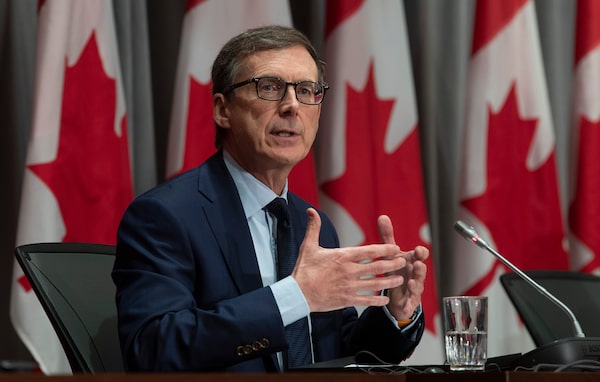
Bank of Canada Governor designate Tiff Macklem, seen here on May 1, 2020, chaired a sustainable-finance panel with recommendations that included calls for specific actions from the government, as well as from the Bank of Canada and Canada’s banking regulator, the Office of the Superintendent of Financial Institutions (OSFI).Adrian Wyld/The Canadian Press
The government’s appointment of Tiff Macklem as Bank of Canada Governor is raising expectations that corporate Canada will face increasing pressure from Ottawa to disclose and address the financial risks of climate change.
Mr. Macklem, the bank’s deputy governor until 2014, was most recently dean of the University of Toronto’s Rotman School of Management, as well as a director of Scotiabank and chair of its board risk committee.
However, one of his most high-profile assignments in recent years was to chair an expert panel on sustainable finance, a federally appointed panel that submitted a report and recommendations last year to Finance Minister Bill Morneau and then-environment minister Catherine McKenna.
The term sustainable finance generally refers to the encouragement or regulation of business to incorporate environmental or social factors in decisions. The approach is seen as a way of accelerating the transition to a low-carbon economy.
Some of the sustainable-finance panel’s recommendations called for specific actions from the government, as well as from the Bank of Canada and Canada’s banking regulator, the Office of the Superintendent of Financial Institutions (OSFI).
For the financial bodies, those include integrating climate risks into the supervision of federally regulated financial institutions and to “articulate the importance of climate-smart investing as an emerging global best practice.”
The report also said the Bank of Canada should regularly meet with Canadian asset managers to exchange information on climate-related financial risk.
“I see the fact that he was a member of the expert panel on sustainable finance as a positive factor in terms of him being appointed as the governor of the bank,” said Liberal MP Wayne Easter, who chairs the House of Commons finance committee. The committee’s prebudget report called on the government to deliver on the panel’s recommendations.
When Mr. Macklem was deputy governor, Mark Carney was governor. Mr. Carney has since become one of the world’s most prominent sustainable-finance advocates. He recently returned to Ottawa after completing his term as governor of the Bank of England and is currently a United Nations special envoy on climate action and finance.
In early March, Prime Minister Justin Trudeau was putting business leaders on notice that the push toward a low-carbon economy will be “a big adjustment for many industries.” Mr. Trudeau’s comments to a mining conference were delivered at a time when the government was still planning to release a climate-focused budget later that month.
The planned March 30 budget was ultimately shelved indefinitely as the government shifted its focus to the novel coronavirus pandemic.
The appointment of Mr. Macklem, who has held senior positions in the Finance Department, is raising expectations that the climate focus will return as the government’s attention shifts to the economic recovery phase of addressing the COVID-19 fallout.
Merran Smith, executive director of Simon Fraser University’s Clean Energy Canada think tank, is involved in discussions with several federal ministers about how the eventual stimulus phase of the economic recovery can focus on addressing climate change.
In an interview, she noted that Mr. Macklem spoke last year about the need for the financial sector to invest in areas such as clean electricity and retrofitting buildings.
“His appointment is a real signal from the federal government that they want this type of thinking to permeate both the Bank of Canada and Canada’s financial sector more broadly,” she said.
The government has asked some ministers, including Ms. McKenna, now Infrastructure Minister, Environment Minister Jonathan Wilkinson and Heritage Minister Steven Guilbeault to consult experts on policy options for the longer-term economic recovery.
Ms. McKenna recently told The Globe and Mail that she has consulted with Ms. Smith and Mr. Carney as part of those discussions.
One government official said Mr. Macklem was asked to chair the sustainable-finance panel because of his knowledge of domestic and international financial systems. However, the official, whom The Globe is not identifying because they were not authorized to speak publicly on the matter, played down any direct connection between that work and the bank appointment.
“Tiff Macklem’s experience more broadly is the reason why he’s going to be the next Bank of Canada governor,” the official said.
Ryan Riordan, Director of Research at Queen’s University’s Institute for Sustainable Finance, predicted that Mr. Macklem will shift the bank’s tone on climate issues.
“I think it’s going to change from lukewarm to extremely, extremely positive and relevant,” he said. “I think where Tiff might make a change is that I think he would probably be more willing to be public and open about what it is that the bank is doing, what it is that the bank actually thinks of the risks associated with climate change.”
Know what is happening in the halls of power with the day’s top political headlines and commentary as selected by Globe editors (subscribers only). Sign up today.